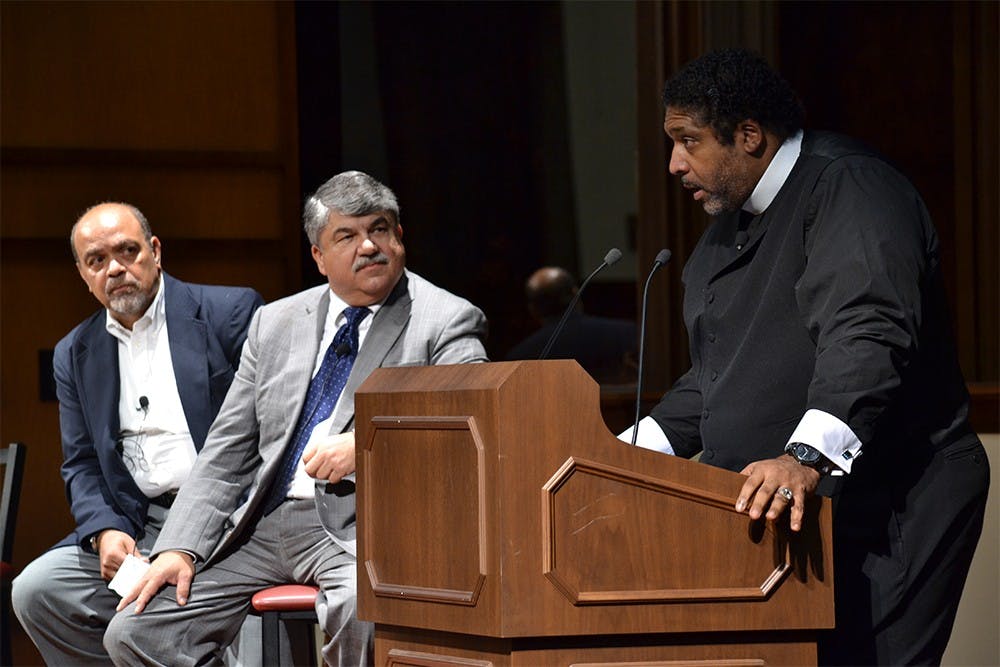The first reconstruction was after the abolition of slavery. The second was during the civil rights movement of the 1950s and 1960s.
Today, he sees a third reconstruction forming not just from movements that address racial issues, but movements that address labor, LGBTQ, immigration and women’s issues.
“No one victory will usher in the end of another community and no single setback can frustrate us, we can build a new world,” Barber said. “That’s why I’m here.”
Barber joined American Federation of Labor and Congress of Industrial Organizations President Richard Trumka on Wednesday in a conversation moderated by William Morris, a local attorney who advocates for homeless people’s rights and is commissioner for Bloomington and Monroe County Civil Rights Commissions as a part of this year’s Themester.
Themester is a program by the College of Arts and Sciences that creates courses and organizes co-curricular activities on a specific theme. This Themester is titled “@Work: the nature of labor on a changing planet.”
“We wanted several events during Themester to highlight the lost connection between the civil rights and the labor rights which have often been twin movements in history,” said Alex Lichtenstein, co-chair for this Themester and associate professor of history.
The talk brought together the two movements, but it also brought in the community by having Morris moderate the event, and it brought in students by having the Black Student Union moderate an audience question-and- answer session.
Before the question-and-answer session, both leaders spoke about how they see the movements intersecting and how they see the future of the United States when it comes to labor and racial equality.
Barber brought up the necessity of understanding the civil rights movement, labor movement and other movements historically.
“Until we have a 50-state movement of labor and civil rights working together, and until we organize in the South and break the back of the Southern strategy and open up a solid South, America will always be restrained and held back from reaching her greatest potential,” Barber said.
Trumka emphasized the necessity of uniting all social movements. This is something he has worked to do as AFL-CIO president by bringing non-labor leaders into leadership positions within his organization.
Trumka said this way of thinking, that social movements must unite, goes back to the beginnings of the mine workers’ labor movements in the 1890s, which brought together miners regardless of race.
“We knew that if we were allowed to be divided for any reason — because of color of our skin, because of the way we spoke, because of the way worshiped or who we loved, that we were weakened, that we would always be able to be beaten one at a time,” Trumka said. “So we came together.”
Barber said that it is also essential to bring young people into social movements, and Trumka said it is important to reshape their organizations to meet the needs of young people who might join.
“What I’ve found is when you change the narrative from democrat versus republican to the soul of the country, there’s something about idealism that attracts young people,” Barber said. “...The goal of any movement is to first transform the imagination. What could be, what’s possible. What must be.”
Trumka told a story from his childhood growing up in a mining community, wherein his best friend was black. He said he didn’t understand why people treated his best friend differently, and when his father explained racism to him, he decided to become outspoken against prejudice.
“I made up my mind at that moment that I was going to fight racism and phobias and discrimination every where I found it at any time,” Trumka said. “I wouldn’t keep my mouth shut when it happened in front of me, that I would have to speak up and speak out.”






